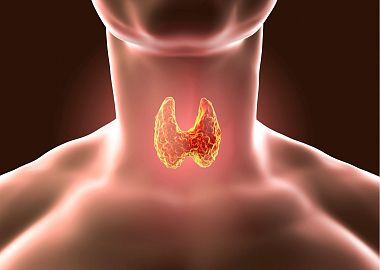Information about an overactive thyroid gland (hyperthyroidism).

General
The function of the thyroid gland is to produce hormones. The most well known thyroid hormones are thyroxine (T4) and triiodothyronine (T3). These hormones are important for the body’s metabolic rate (how your cells use energy) and for growth. When your thyroid gland produces too much of these hormones it results in an overactive thyroid, which is also known as hyperthyroidism. The most common cause of an overactive thyroid gland is an autoimmune condition (Graves’ disease). Other causes include overproduction of thyroid hormones by an enlarged thyroid gland (nodule or goiter), inflammation of the thyroid gland, and medication.
Symptoms
Physical symptoms and signs of an overactive thyroid gland include swelling in the neck (enlarged thyroid gland), weight loss/inability to gain weight, increased appetite, sensitivity to heat, sweating, fast and/or irregular heart rate, heart cramp during rest, diarrhea (sporadic), soft stool, trembling hands, muscle twitching, muscle weakness, warm skin, restless movements, restless sleep and/or difficulty falling asleep, muscle weakness in the arms and legs, shortness of breath after exertion, changes in menstruation, miscarriages, infertility, hair loss, loose nails, sensitivity to sound, feeling tired all the time, bulging eyes, staring or startled appearance, red irritated eyes, dry or gritty eyes.
Mental symptoms associated with an overactive thyroid may include feeling agitated, irritability, impatience, emotional instability, nervousness, talking and thinking rapidly, fatigue, feeling exhausted, not being able to stop working, overstressed, anxiety, paranoia, aggressiveness, low self-esteem.
Testing and diagnosis
An overactive thyroid gland can be diagnosed with blood tests. The blood tests will be used to detect the presence of thyroid hormone (free T4) and the thyroid-stimulating hormone (TSH). In people with an overactive thyroid gland, the level of FT4 will be high and the TSH level low. Furthermore, certain antibodies (anti-TSH receptor) can be measured. These are often elevated in people with Graves’ disease. Sometimes an additional thyroid scan (scintigraphy) is required to determine the cause of the overactive thyroid gland.
Treatment
An overactive thyroid gland can be treated using drugs, radioactive iodine, or thyroid surgery. Your internist/endocrinologist will discuss with you whether these treatments are appropriate for you.
Click here for the patient leaflet on hyperthyroidism (Dutch) published by the Dutch Association for Endocrinology (NVE).
GeneralA goiter is an enlargement of the thyroid gland. This enlargement can be smooth and uniform (diffuse goiter) or it can be caused by one or more lumps within the gland (nodul...
GeneralLumps in the thyroid gland (called thyroid nodules) are common. About 8% of adults have a perceptible nodule in the thyroid gland. In fact, as many as 25-40% of the ad...
GeneralCancer is a group of malignant cells that can form a growth, also called a carcinoma. These cells invade the surrounding healthy tissue and/or break away and spread througho...
GeneralThe function of the thyroid gland is to produce hormones. The most well known thyroid hormones are thyroxine (T4) and triiodothyronine (T3). These hormones are important for...
GeneralPeople with Graves’ disease (overactive thyroid gland) may also develop eye problems. This is also called Graves’ orbitopathy or ophthalmopathy. The eye disease...